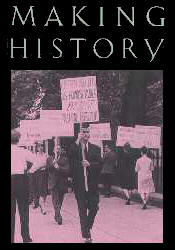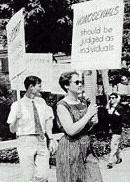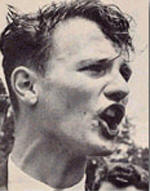 |


|
|
|
|
Film Review By Jack Nichols
During this seminal era, therefore, a bold little band of practical dreamers initiated the next decades' exodus from America's closet, breaking free of old oppressive traditions followed without question by our then-silent but vast and many-sided communities. I both planned and took part in these emerging steps--the first gay movement protest pickets. Thanks to Glenn Holsten, Emily Topper, Pridefest America, the Dolfinger-McMahon Foundation, WHYY-TV, and certain PBS affiliates, footage of our emerging steps can now be seen as an unprecedented opening in the long stifled history of human love. As a reviewer, I hold an insider's advantage—in that I've actually asked my bold brother and sister comrades-in-arms honored in Gay Pioneers—how they feel today as they watch this film recounting our long ago steps, steps that, in the nearly four decades since, have remained for each of us a source of deep-going satisfaction. “We had cracked the cocoon of invisibility,” says Barbara Gittings in the film, explaining our attitudes: “I am not going to live in a closet anymore. It's stuffy in there. I'm not going to live under a rock to protect your feelings.”
Gay Pioneers begins by showcasing one of the Mattachine Society of Washington's early petitions, an attempt to communicate with the FBI, along with other government departments. The letter was Franklin E. Kameny's. He was the founding president of the Mattachine Society of Washington. I hear Frank's familiar voice reading his own unambiguous and thorough admonitions to the closeted FBI director, J. Edgar Hoover, one which, writing on an internal memo, Hoover's companion, Clyde Tolson seems to favor ignoring. Kameny begins by noting the passing of five months since an earlier such letter had also been ignored. It was just such treatment by the U.S. Government that soon impelled some of us to picket. They'd refused to talk first. Picketing became necessary. In Gay Pioneers, Kameny lectures the image-conscious J. Edgar Hoover:
“In those days, a great deal of the most fundamental groundwork had yet to be done. We see here some of that foundation-laying actually being done publicly, and some of the people doing it, as they then were and as they now are.” I called on Lilli Vincenz who played a major part in Gay Pioneers and in the first pickets. She said: “In presenting these interviews with elders of the Gay civil rights movement, producers Glenn Holsten and Emily Topper have beautifully woven together the old and the new, providing glimpses into the political and social reality of the 60s, where radical change was everywhere, and where homophile leaders successfully rode that wave, paving the way for Stonewall. “Accompanied by music and documentary footage reflecting the ferment and excitement characterizing that decade, narration by and portraits of homophile activists are juxtaposed to show us picketing in our youth and now, 35 years later, reminiscing about those days. "Immunized against fear" (Jack Nichols), these aging old-timers still reflect the spunk and convictions that made them/us able to declare the first-class status of Gay women and men decades ago. These endearing portraits of the old homophile war horses --and my old friends -- are good for my heart to see! Thank you, Glenn and Emily and staff! Love, Lilli” Randolfe Wicker, homosexuality's pioneering media whiz kid and a talking head in Gay Pioneers shared the following thoughts with me after assessing what he thought was its impact:
“Most historians over emphasize 1969 as 'the beginning' of the homosexual civil rights movement. They all seemed to have missed the detail that signs promoting the upcoming 'Fourth Annual Demonstration at Philadelphia/s Independence Hall' were posted around the neighborhood at the time the 1969 riots occurred. “It was especially fitting that Gay Pioneers saw the first large Christopher Street Liberation Day March in 1970 as an outgrowth of the earlier small annual demonstrations in Philadelphia. The 1970 march was simply a much larger spontaneous uninhibited version of what had commenced years before. “Gay people seem unaware of their own history. Few realize that the struggle for gay respect and dignity actually began in Germany in 1892. The mythology that everything began with Stonewall has swallowed our real history. Gay Pioneers reclaims part of that lost history.” I was delighted, although not surprised, by Glenn Holsten's artful use of background music in Gay Pioneers. He'd traveled over a thousand miles to interview me. As we were talking before the filming, one topic became American music. Holsten's knowledge of it, I decided, is encyclopedic. When he left, I felt as though I'd trusted a special part of me to a talented young genius. Seeing his final half-hour product, my intuitive reaction has now been amply vindicated. Gay Pioneers has already been aired by Philadelphia's WHYY and by PBS in that area. It will broadcast by WETA in Washington, D.C. on June 1st at 11pm. Ask PBS in your area to air it. “It's wonderful,” writes Glenn Holsten, “to hear about history from those who lived it.” |

© 1997-2002 BEI
 Jack Nichols, followed by Frank Kameny
and Lilli Vincenz seen here in 1965 protesting at the White House and featured on the cover of Making History by Eric Marcus. The three pioneers have been featured in the moving documentary, Gay Pioneers.
Jack Nichols, followed by Frank Kameny
and Lilli Vincenz seen here in 1965 protesting at the White House and featured on the cover of Making History by Eric Marcus. The three pioneers have been featured in the moving documentary, Gay Pioneers.
 Barbara Gittings protesting for gay equality in the 1960s
Barbara Gittings protesting for gay equality in the 1960s  Activist Randy Wicker
Activist Randy Wicker